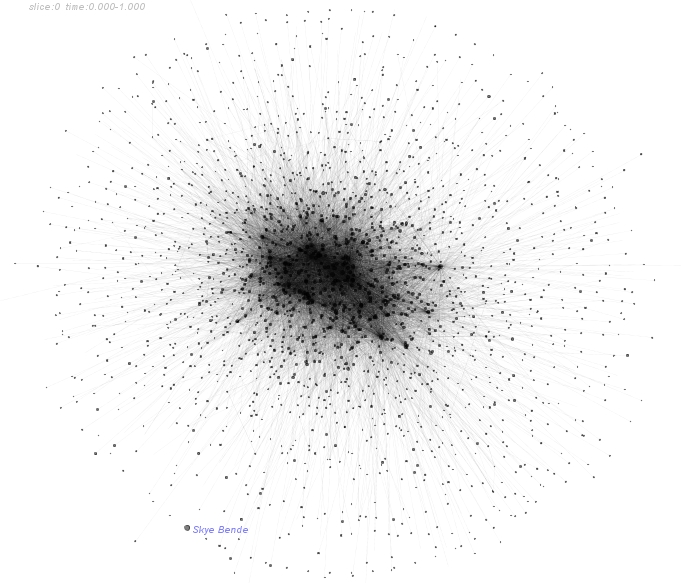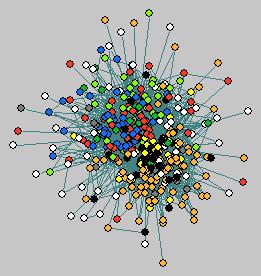I started poking around in omidyar.net a few days ago, curious if it can be a resource for locating activist techs and funding. As I’m not really a member of any of the “social networking” sites, I don’t really have a sense of the social protocol. It is kind of like stepping blind into a cocktail party. A few people immediatly contacted me, but I didn’t know who they were other than by reading their profiles. So I got curious about the structure of communication of the site. After a day or so of coding with a little help from carnivore, htmlparser and sonia, I’ve got a few pictures of the network of positive feedback on comments. (people have the ability to give points to eachother’s posts in the fourms, kinda like slashdot)

Monthly Archives: July 2006
Commerce info tracking, etc
Nice idea, building collaborative software for tagging and tracking commercial products. “Network of Integrated Consumer Knowledge” Eugene based software co. http://www.grasscommons.org/
Grass Commons, a 501(c)3 public interest charity, is building pipelines between those who can generate information about products and companies and those who can use that information to build a more sustainable economy and a better world.
Grasscommons seems to have a collaborative relationship with Hooze,
Hooze.org is about collaborating to gather useful, reliable info about the products and companies that are shaping our world.
Hooze is the world’s first public wagging site. Wagging combines wiki and tagging in unique ways so that communities of users can organically develop ways of organizing and presenting information. The combo cards at the bottom of this page are an example of how wagging differs from other tools.
Krugal Code Search Engine
Krugal seems to be a nice project for searching code snips and algorithm implementations. Currently mostly sourceforge stuff, I found some very familiar code ;-) also alternate implementations I’d like to look at in detail
Krugle is designed to locate code. Krugle supports code search by crawling, parsing and indexing code found in all open source repositories, as well as code that exists in archives, mailing lists, blogs, and web pages. (http://corp.krugle.com/product/index.html)
Definitly still in beta, but seems to work pretty well.
PajekConverter

PajekConverter is a basic utility (written in Java) for converting tab-delineated text files into a format readable by the network analysis and visualization software Pajek. Pajek is Windows-based freeware, written by Vladimir Batagelj and Andrej Mrvar, University of Ljubljana, Slovenia Downloadable from: vlado.fmf.uni-lj.si/pub/networks/pajek/
PajekConverter was written by skye for John Padgett, University of Chicago.
Bugs and Questions to:
skyebend@santafe.edu
Version 1.2 9/3/01 Added ability to parse external .txt files, some fixes
Download PajekConverter v1.2 and documentation (ZIP compressed jar)
View documentation (*.txt)
Download Java source code (ZIP file)
